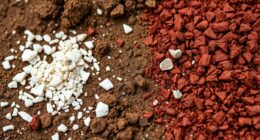Magnesium sulfate is widely used as a fertilizer to provide essential nutrients like magnesium and sulfur, which support plant growth, improve soil health, and boost crop yields quickly. It’s also important in industrial processes such as water treatment, textile manufacturing, and chemical production, where it helps control pH and remove impurities. Understanding its various applications can help you optimize its benefits—stay tuned to discover how this versatile compound can serve your needs.
Key Takeaways
- Magnesium sulfate supplies essential nutrients like magnesium and sulfur, boosting plant growth and correcting soil deficiencies.
- It enhances soil health, supports sustainable farming, and promotes better crop yields, especially for magnesium-demanding crops.
- Used as a fertilizer via soil application or water dissolution, it offers rapid nutrient availability and improves nutrient uptake.
- Industrial applications include water treatment, textile processing, paper manufacturing, and chemical production.
- Proper handling and selecting the right chemical grade maximize its effectiveness in both agricultural and industrial uses.

Magnesium sulfate is a chemical compound widely used in medical, industrial, and agricultural settings. When you work with or handle magnesium sulfate, understanding its role as a fertilizer and industrial material can help you maximize its benefits and guarantee safe, effective use. As a fertilizer, magnesium sulfate, often called Epsom salt, supplies essential nutrients to plants, particularly magnesium and sulfur. Magnesium is indispensable for photosynthesis because it forms the core of the chlorophyll molecule. Without enough magnesium, your plants may turn yellow, show stunted growth, or produce poor yields. Sulfur, on the other hand, is essential for protein synthesis and enzyme function. When you apply magnesium sulfate to soil, it quickly dissolves, making these nutrients readily available for plant roots. This makes it especially useful in soils deficient in magnesium or sulfur, which are common in certain regions or with specific crop types. You can use it as a soil amendment, broadcasting it directly or dissolving it in water for irrigation. It’s particularly popular for crops like tomatoes, peppers, and strawberries, which have high magnesium requirements. Its fast action means you’ll often see results within a few weeks, improving plant health and productivity. Additionally, magnesium sulfate can help correct soil deficiencies and improve overall soil health, supporting sustainable farming practices. Applying magnesium sulfate can also enhance the nutrient uptake of plants, making other fertilizers more effective. Recent studies highlight its role in soil chemistry by influencing pH levels and nutrient availability, further emphasizing its agricultural importance. Proper application techniques can optimize its benefits and prevent potential soil imbalances. In industrial contexts, magnesium sulfate plays a key role in manufacturing, textile processing, and water treatment. If you’re involved in these sectors, you might use magnesium sulfate as a raw material or as part of a process to produce other chemicals. For instance, in the paper industry, magnesium sulfate helps in controlling pH levels during processing, guaranteeing the quality of the final product. In water treatment, it’s used to remove impurities like calcium and magnesium ions that cause water hardness. This process, known as softening, improves water quality for industrial processes or municipal supply. You may also encounter magnesium sulfate in the production of textiles, where it helps in fabric dyeing and finishing. Its applications extend to the production of magnesium metal, where it serves as a source of magnesium ions during electrolysis. Given its versatility, magnesium sulfate’s industrial uses often depend on its purity and chemical form, so understanding these variations can help you choose the right grade for your specific needs. Whether you’re applying it to boost plant growth or using it in manufacturing, magnesium sulfate’s importance across fields is undeniable. Handling it with care and understanding its functions will allow you to leverage this compound’s full potential, guaranteeing results and safety in your work.
Frequently Asked Questions
Is Magnesium Sulfate Environmentally Safe to Use?
You’re wondering if magnesium sulfate is environmentally safe to use. Generally, it’s considered safe when used properly, as it’s a natural mineral that dissolves easily and minimizes pollution. However, overuse can lead to water contamination, affecting aquatic life. To stay eco-friendly, follow recommended application rates and avoid runoff into water sources. When used responsibly, magnesium sulfate can benefit plants without harming the environment.
How Does Magnesium Sulfate Compare to Other Fertilizers?
Did you know magnesium sulfate is one of the most cost-effective fertilizers? Compared to others, it provides quick magnesium and sulfur absorption, boosting plant health efficiently. You’ll find it ideal for correcting deficiencies without risking over-fertilization. Unlike some fertilizers that can harm soil over time, magnesium sulfate is environmentally friendly when used properly. So, if you’re aiming for healthy crops with minimal environmental impact, it’s a smart choice.
Can Magnesium Sulfate Be Used in Organic Farming?
You might wonder if magnesium sulfate fits into organic farming. The good news is, yes, it can be used because it’s a naturally occurring mineral. Organic standards often accept it as a soil supplement to boost magnesium and sulfur levels. Just verify it’s approved by your organic certification body and used appropriately to support healthy plant growth without synthetic chemicals.
What Are the Signs of Magnesium Deficiency in Plants?
If your plants show signs of magnesium deficiency, you’ll notice yellowing leaves starting from the edges and moving inward, especially on older leaves. You might also see interveinal chlorosis, where the veins stay green but the tissue between turns yellow. Your plants could grow more slowly and develop weaker stems. To fix this, you can apply magnesium sulfate, which quickly supplies the needed magnesium, helping your plants recover and stay healthy.
Are There Any Health Risks Associated With Industrial Magnesium Sulfate?
You might worry about health risks from industrial magnesium sulfate, but it’s generally safe when used properly. Exposure in large amounts can cause skin or eye irritation or respiratory issues, especially during manufacturing. However, with proper handling and safety measures, your risk stays low. Trust that industries follow strict regulations to protect workers and the environment, making accidental health problems rare. Stay informed and follow safety guidelines for peace of mind.
Conclusion
In essence, magnesium sulfate plays a crucial role both as a fertilizer and industrial chemical. Did you know that over 70% of magnesium sulfate is used in agriculture to boost crop yields? This highlights its importance in supporting global food production. Whether you’re applying it to improve soil health or using it in industrial processes, magnesium sulfate proves to be a versatile and essential compound in various sectors, making it a valuable resource worldwide.









